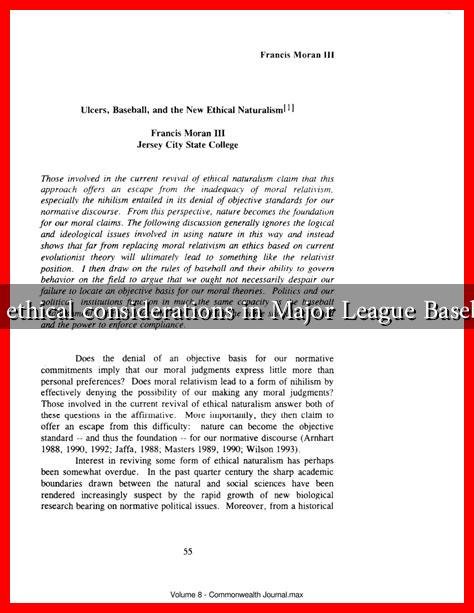-
Table of Contents
What are the Ethical Considerations in Major League Baseball Decisions?
Major League Baseball (MLB) is not just a sport; it is a cultural phenomenon that influences millions of fans and players alike. As with any major organization, ethical considerations play a crucial role in the decision-making processes within MLB. From player conduct to business practices, the ethical implications of decisions can have far-reaching consequences. This article explores the various ethical considerations in MLB decisions, highlighting key issues, examples, and the impact on stakeholders.
Player Conduct and Integrity
One of the most significant ethical considerations in MLB revolves around player conduct and integrity. The league has established a set of rules and regulations to maintain the integrity of the game, including policies on performance-enhancing drugs (PEDs) and gambling.
- Performance-Enhancing Drugs: The use of PEDs has been a contentious issue in MLB.
. High-profile cases, such as those involving Barry Bonds and Alex Rodriguez, have raised questions about fairness and the integrity of the sport. The league’s efforts to combat drug use include strict testing protocols and penalties for violations.
- Gambling: The ethics of gambling in sports have come under scrutiny, especially with the rise of sports betting. MLB has implemented policies to prevent players and officials from engaging in gambling activities that could compromise the integrity of the game.
Labor Relations and Player Rights
Another critical ethical consideration in MLB is the relationship between the league and its players. Labor relations have historically been fraught with tension, particularly regarding player rights, salaries, and working conditions.
- Collective Bargaining: The collective bargaining process between MLB and the Players Association is essential for addressing player rights. Ethical considerations arise when negotiating contracts, as players seek fair compensation while the league aims to maintain profitability.
- Minor League Treatment: The treatment of minor league players has also come under ethical scrutiny. Many minor leaguers earn low wages and lack adequate benefits, raising questions about the league’s commitment to player welfare.
Diversity and Inclusion
Diversity and inclusion are vital ethical considerations in MLB, particularly in light of the league’s history and the ongoing challenges faced by underrepresented groups.
- Hiring Practices: The lack of diversity in managerial and executive positions has prompted discussions about the ethical implications of hiring practices. Initiatives like the “Rooney Rule” in the NFL have been suggested for MLB to ensure that minority candidates are considered for leadership roles.
- Community Engagement: MLB teams are increasingly focusing on community engagement and outreach programs aimed at promoting diversity and inclusion. These initiatives can help bridge gaps and foster a more inclusive environment.
Environmental Responsibility
As society becomes more aware of environmental issues, MLB faces ethical considerations regarding its impact on the environment. The league has made strides in promoting sustainability, but challenges remain.
- Stadium Construction: The construction and operation of stadiums can have significant environmental impacts. Ethical considerations include the use of sustainable materials and energy-efficient practices.
- Waste Management: MLB has initiated programs to reduce waste at games, such as recycling and composting efforts. However, the effectiveness of these programs is often scrutinized.
Conclusion
Ethical considerations in Major League Baseball decisions are multifaceted and complex. From player conduct and labor relations to diversity and environmental responsibility, the league must navigate a myriad of ethical challenges. As MLB continues to evolve, it is essential for stakeholders—players, management, and fans—to engage in discussions about these ethical issues to ensure the integrity and sustainability of the sport. By addressing these concerns, MLB can foster a more equitable and responsible environment that benefits all involved.
For further reading on ethical issues in sports, you can explore resources from the Sports Ethics Institute.





